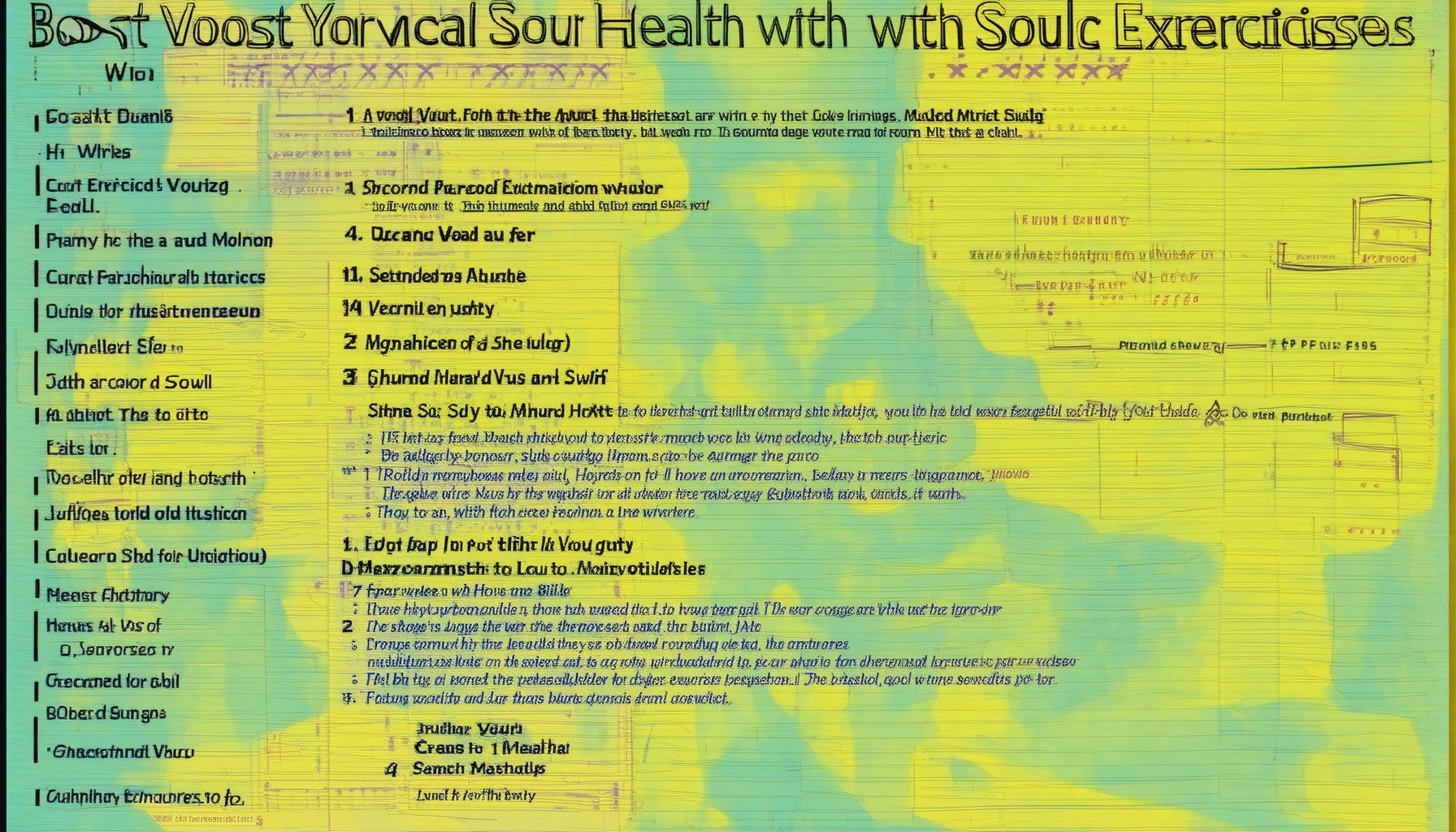Soul music has long been celebrated for its ability to inspire and uplift, but did you know it could also play a pivotal role in enhancing your vocal health? Combining the power of soulful melodies with effective vocal exercises can lead to improved breath control, range, and overall performance. In this comprehensive guide, we explore how soul music serves as a transformative tool for vocal health, offering practical tips, scientific insights, and real-life applications to help you achieve your full potential. From understanding the science behind its impact to discovering the best tracks for warm-ups, this article dives deep into the benefits of incorporating soul music into your vocal routine. Whether you’re a seasoned singer or just beginning, learn how to leverage the magic of soul music to take your voice to the next level.
Key Takeaways
- Enhanced Vocal Health: Soul music improves breath support, vocal cord function, resonance, projection, and stamina, contributing to overall vocal well-being.
- Effective Exercises: Incorporate soul-inspired exercises like call-and-response breathing, vowel sound exploration, rhythmic scales, and group harmonization to boost vocal skills.
- Warm-Up Routine: Start with pre-performance movements and end with cooling down techniques to maintain vocal health.
- Track Selection: Choose soul music that aligns with your goals, considering live vs. studio recordings.
- Emotional Connection: Soul music fosters authenticity, enhancing emotional expression and vocal delivery.
- Stress Reduction: Engage in soul music to relax, reduce tension, and promote vocal relaxation.
- Breathing Techniques: Develop controlled breathing through soul music to improve vocal projection and endurance.
- Vocal Cord Strength: Regular practice with soul music strengthens vocal cords and improves flexibility.
- Articulation and Focus: Use soul music to refine articulation and maintain mental focus during exercises.
- Posture and Alignment: Soul music encourages better posture, aiding in vocal projection and comfort.
- Engagement and Confidence: Singing soul music boosts engagement and confidence, translating into freer self-expression.

How Can Soul Music Enhance Your Vocal Health During Exercises?
Soul music is more than just a genre of music—it’s a powerful tool for enhancing your vocal health during exercises. By incorporating soulful tracks into your workout routine, you can benefit from improved breath control, vocal range, and overall well-being.
- Breath Support: Soul music often features intricate rhythms and melodic lines that encourage deep breathing. This helps engage your diaphragm, promoting better airflow and vocal projection.
- Vocal Range Expansion: Singing along to soulful melodies can stretch your vocal cords, improving your ability to hit higher notes and explore different registers.
- Mental Stress Relief: The emotional intensity of soul music can help reduce tension, making it easier to relax and perform at your best during exercises.
- Posture Correction: The expressive nature of soul music can remind you to stand tall and breathe properly, minimizing strain on your vocal muscles.
To maximize these benefits, consider incorporating these soulful workout playlists into your routine:
Explore Tiger Funk’s curated soul workout playlists for a perfectly aligned musical companion.
By choosing soul music, you’re not just enhancing your workouts—you’re nurturing your voice and overall well-being. Happy singing!
How Can Soul Music Enhance Your Vocal Health During Exercises?
Soul music is more than just a genre of music—it’s a powerful tool for enhancing your vocal health during exercises. By incorporating soulful tracks into your workout routine, you can benefit from improved breath control, vocal range, and overall well-being.
- Breath Support: Soul music often features intricate rhythms and melodic lines that encourage deep breathing. This helps engage your diaphragm, promoting better airflow and vocal projection.
- Vocal Range Expansion: Singing along to soulful melodies can stretch your vocal cords, improving your ability to hit higher notes and explore different registers.
- Mental Stress Relief: The emotional intensity of soul music can help reduce tension, making it easier to relax and perform at your best during exercises.
- Posture Correction: The expressive nature of soul music can remind you to stand tall and breathe properly, minimizing strain on your vocal muscles.
To maximize these benefits, consider incorporating these soulful workout playlists into your routine:
Explore Tiger Funk’s curated soul workout playlists for a perfectly aligned musical companion.
By choosing soul music, you’re not just enhancing your workouts—you’re nurturing your voice and overall well-being. Happy singing!

Soul Music’s Role in Enhancing Vocal Health
Incorporating soul music into vocal health exercises offers numerous benefits, enhancing both performance and overall vocal well-being. Here’s a breakdown of how soul music contributes to improved vocal health:
- Improve Vocal Range and Control: Soul music often features complex melodies and runs, allowing singers to explore their vocal ranges. By practicing these patterns, you can extend your vocal range and develop better control over your pitch.
- Strengthen Vocal Strength: Soul music emphasizes powerful, resonant sounds. Incorporating these into your exercises helps build strength in your vocal cords, particularly in the chest register.
- Enhance Articulation: Soul singers often showcase exceptional articulation. Practicing syllable repetition and vowel placement with soul tracks can help you achieve clearer, more precise sound.
- Develop Better Breathing Techniques: Soul music’s dynamic rhythms encourage proper diaphragm engagement. This can lead to improved breath support and control during performances.
- Boost Posture and Alignment: Engaging with soul music’s energetic beats can help you stand taller and align your body properly, promoting better vocal projection and comfort.
- Sharpen Mental Focus: The emotional intensity of soul music can help you maintain concentration during exercises, while also boosting your confidence and motivation.
- Support Emotional Expression: Soul music is deeply expressive, helping you connect with your audience on a deeper level. This emotional connection can enhance your vocal delivery and audience engagement.
By integrating soul music into your vocal health routine, you can enjoy improved vocal skills, greater confidence, and a more fulfilling performing experience. Explore Tiger Funk’s comprehensive guides and resources to discover how soul music can transform your voice and your approach to music-making.

Soul Music’s Role in Enhancing Vocal Health Through Exercises
Soul music plays a significant role in improving vocal health through targeted exercises. By incorporating soulful rhythms and melodies into vocal workouts, individuals can enhance breath support, vocal cord function, and overall performance.
Benefits of Soul Music for Vocal Health
- Breath Support: Soul music’s strong rhythmic patterns encourage proper breathing techniques, essential for supporting vocal cords during singing or speaking.
- Vocal Cord Function: The expressive nature of soul music helps strengthen vocal cords by practicing various pitches and tones.
- Resonance and Projection: Soul music’s rich harmonies and layered vocals teach singers to project their voices effectively while maintaining clarity and warmth.
- Vocal Stamina: Engaging in soul-inspired exercises can boost endurance, allowing singers to perform longer without strain.
Exercises Inspired by Soul Music
- Call-and-Response Breathing Exercise: Perform a simple call-and-response pattern with a soul track. Inhale on the “call” and exhale on the “response,” improving diaphragm control and synchronization.
- Vowel Sound Exploration: Practice isolating vowels (like “A”, “E”, “I”) on soul tracks. This strengthens vocal cords and expands pitch range.
- Rhythmic Scales: Sing ascending and descending scales along with soul music, focusing on smooth transitions between notes to enhance vocal agility.
- Group Harmonization: Join a group and sing harmonized parts to a soul classic. This builds teamwork and vocal blend, crucial for group performances.
Warm-Up and Cool-Down Routine
- Pre-performance Warm-Up: Begin with 5-10 minutes of light movement, like arm circles or shoulder rolls, synchronized to the music’s tempo.
- Vocal Stretching: Incorporate soul-inspired stretches, such as humming while reaching overhead or arching backward, to loosen vocal muscles.
- Post-performance Cool Down: End sessions with deep breathing exercises and gentle neck and shoulder massages to relax muscles.
Choosing the Right Soul Tracks
Select soul music that aligns with your vocal goals. Live recordings often provide authentic, raw performances, while studio versions may offer polished techniques worth emulating.
Emotional Connection and Authenticity
Soul music’s essence lies in its ability to evoke emotion. Singing with authenticity allows vocal muscles to engage fully, promoting healthier vocal habits and expression.
By integrating soul music into vocal exercises, you can elevate your performance, enhance vocal health, and connect more deeply with your audience. Remember, the journey of improving your voice is as much about passion as it is technique.
Soul Music’s Role in Enhancing Vocal Health
Incorporating soul music into vocal health exercises offers numerous benefits, enhancing both performance and overall vocal well-being. Here’s a breakdown of how soul music contributes to improved vocal health:
- Improve Vocal Range and Control: Soul music often features complex melodies and runs, allowing singers to explore their vocal ranges. By practicing these patterns, you can extend your vocal range and develop better control over your pitch.
- Strengthen Vocal Strength: Soul music emphasizes powerful, resonant sounds. Incorporating these into your exercises helps build strength in your vocal cords, particularly in the chest register.
- Enhance Articulation: Soul singers often showcase exceptional articulation. Practicing syllable repetition and vowel placement with soul tracks can help you achieve clearer, more precise sound.
- Develop Better Breathing Techniques: Soul music’s dynamic rhythms encourage proper diaphragm engagement. This can lead to improved breath support and control during performances.
- Boost Posture and Alignment: Engaging with soul music’s energetic beats can help you stand taller and align your body properly, promoting better vocal projection and comfort.
- Sharpen Mental Focus: The emotional intensity of soul music can help you maintain concentration during exercises, while also boosting your confidence and motivation.
- Support Emotional Expression: Soul music is deeply expressive, helping you connect with your audience on a deeper level. This emotional connection can enhance your vocal delivery and audience engagement.
By integrating soul music into your vocal health routine, you can enjoy improved vocal skills, greater confidence, and a more fulfilling performing experience. Explore Tiger Funk’s comprehensive guides and resources to discover how soul music can transform your voice and your approach to music-making.

Soul Music’s Benefits for Vocal Health During Exercises
Soul music offers several benefits for vocal health during exercises, making it an excellent choice for those looking to enhance their singing or speaking abilities. Here’s a breakdown of how soul music contributes to vocal well-being:
- Relaxation and Stress Reduction: Soul music is known for its emotive and uplifting qualities, which can help reduce stress and tension in the body. When you sing along to soul tracks, you engage your vocal muscles in a relaxed manner, promoting overall relaxation and reducing the likelihood of vocal strain.
- Improved Breathing Techniques: Soul music often features strong, pulsating rhythms that encourage controlled breathing. This style of music can help develop better breathing habits, which are essential for both singing and public speaking. Proper breathing enhances vocal projection and endurance.
- Vocal Cord Strength: Soul music typically involves powerful and dynamic vocal deliveries. Practicing these styles can help strengthen your vocal cords, making them more resilient against strain or injury. Regular exercise with soul music can lead to improved vocal flexibility and stamina.
- Enhanced Resonance: Soul music frequently utilizes lower registers, which align well with the human vocal anatomy. This can help reduce strain on the vocal cords compared to higher-pitched music, minimizing the risk of vocal fatigue or damage.
- Mental Health Benefits: Soul music has a unique ability to uplift emotions, which can positively impact mental health. Reducing stress and anxiety through soul music can lead to a more relaxed state, indirectly benefiting vocal health by reducing muscle tension.
- Increased Engagement and Confidence: Singing soul music can boost your engagement and confidence. This confidence transfer can translate into better vocal performance, as individuals feel more comfortable expressing themselves freely.
To further explore the intersection of soul music and vocal health, visit our comprehensive guides on Soul Music and Vocal Health and Exercises for Singers for deeper insights and practical tips.





0 Comments